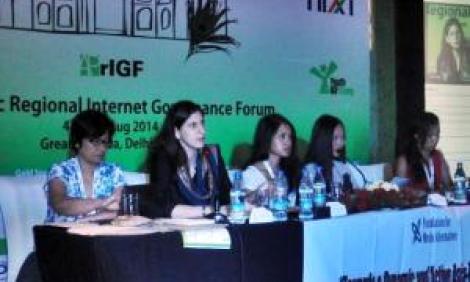
Feminist talk
Ten facts about your computer: Health, hardware and the toll on women
This article takes a look at where our hardware comes from, the electronics factories situated in primarily Asian countries, and the challenges facing the people, primarily women, who work there, and the issues that impact upon women workers in the electronics industry. Ten facts about your computer that illuminate the gendered nature of the labour that is embedded in our hardware.

Feminist talk
[COLUMN] Finding solutions: Using ICTs to face the climate emergency
In her fourth column, Sonia Randhawa looks at whether ICTs can play a role in finding solutions to climate change. However while ICTs seem like an ideal technology for building networks and connections between people, it remains out of reach for most people, especially women who are often at the forefront of struggles in relation to climate change. Community radio is far more accessible for…

Feminist talk
Asia Pacific stakeholders assert ‘Human rights should be the heart of internet governance discussion’
Annually since 2010, stakeholders coming from different countries in the Asia Pacific (AP) meet to discuss pertinent issues on internet governance. This forum where different stakeholders converge to ‘discuss, exchange, and collaborate’ is called the Asia Pacific Regional Internet Governance Forum (APrIGF), a regional Internet Governance Forum (IGF) initiative that hopes to build awareness and…
In depth
Poverty and culture: Key barriers to education and training of women and girls in Cambodia
In this article, the director of End Child Prostitution, Abuse and Trafficking (ECPAT) Cambodia, Chanveasna Chin, speaks with GenderIT.org English editor Sonia Randhawa about the challenges facing women and girls in accessing education and training, particularly in technology.
Publication
16x16: Malaysia
In 16 slides x 16 seconds, Take Back The Tech! presentation narrates the story of how violence against women and ICTs links together in Malaysia. The presentation builds on the paper Malaysia: Violence against Women and Information Communication that , provides a snapshot and baseline on the law and policy in these two areas. The paper is part of the APC WNSP project 'MDG3: Take Back the Tech…
Publication
Cambodia: Violence against Women and Information Communication Technologies
Chim Manavy examines how growth of the internet is pushing the limits of a society's attitudes towards acceptable media images, through exploitative use of images taken for private consumption. Technology is moving across boundaries faster than the law can address. At the same time, ICT use in general, much less awareness of how ICTs can be strategically used to combat violence against women, is…
Publication
Malaysia: Violence against Women and Information Communication Technologies
Jac SM Kee and Sonia Randhawa highlight forms of VAW that have received recognition in Malaysia and provide the context of ICT development and national policy objectives in this paper. It is not an exhaustive assessment of the current state of VAW, but rather aims to surface some of the interconnections between ICT issues and VAW and areas of potential opportunities for advocacy, as well as…
Publication
Mainstreaming Gender Issues in ICT Policy Development - Draft
This is a draft copy of a research conducted by FMA to look into gender mainstreaming efforts in ICT policy development. in the Philippines. In particular, Section 4 of the research is culled to demonstrate and examine ICT policy in the current Philippines context, with attention to the inclusion of gender within its processes.
Publication
Communication Rights Are Women's Rights
The Foundation for Media Alternative's statement in conjunction with International Women's Day, 2006, calls for four specific measures needed to recognize communication rights as women's rights.
Publication
Malaysian gov't must review laws to free media and information
The paper outlines various discriminatory practices that have been faced from the laws on media and communications in Malaysia, as compelling reasons why the legislations must be reformed.




